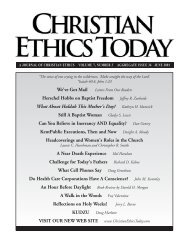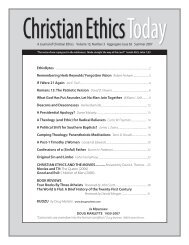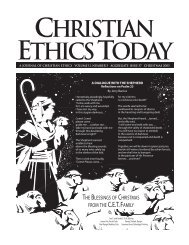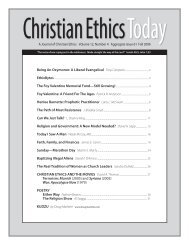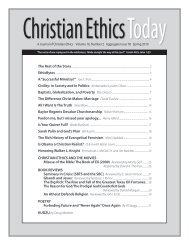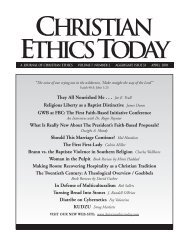Issue 032 PDF Version - Christian Ethics Today
Issue 032 PDF Version - Christian Ethics Today
Issue 032 PDF Version - Christian Ethics Today
Create successful ePaper yourself
Turn your PDF publications into a flip-book with our unique Google optimized e-Paper software.
We are to treat each other accordingly. Indeed, we<br />
must treat our own selves in this way—which is the<br />
reason why suicide has always been ruled out in the<br />
<strong>Christian</strong> tradition. Even the individual is not free to<br />
assign value to his own life. God makes that call, not<br />
us.<br />
2. A second moral implication: we must work to prevent<br />
murder, violence, and other direct assaults on the<br />
sanctity of life.<br />
Exodus 20:13 reads: “You shall not murder.” This<br />
text, the Sixth Commandment, is a critical cornerstone<br />
of the consistent life ethic. The sacredness of human<br />
life implies reverence for life at every stage from conception<br />
to death. It implies that the right to life is the<br />
first and fundamental human right. It requires that<br />
believing <strong>Christian</strong>s be on the front lines of efforts to<br />
prevent or end the shedding of human blood wherever<br />
this occurs.<br />
<strong>Christian</strong>s, especially in our own violent society,<br />
often forget or fail to notice early biblical statements of<br />
God’s revulsion at the violence we do to one another. It<br />
is no coincidence that the primordial sin of murder is<br />
lifted up for such emphasis: “What have you done?<br />
Listen! Your brother’s blood cries out to me from the<br />
ground. Now you are under a curse and driven from<br />
the ground, which opened its mouth to receive your<br />
brother’s blood from your hand” (Gen. 4:10-11).<br />
These words from God to Cain are fully consistent<br />
with God’s later decision to send a flood upon the<br />
earth and start over with Noah and his family.<br />
Listen—“So God said to Noah, I am going to put an<br />
end to all people, for the earth is filled with violence<br />
because of them. I am surely going to destroy both<br />
them and the earth” (Gen. 6:13).<br />
Cardinal Bernardin, and the Catholic moral tradition<br />
generally, grounds the moral piece of the consistent<br />
life ethic right here at this point: the “prohibition<br />
6 • FEBRUARY 2001 • CHRISTIAN ETHICS TODAY<br />
against direct attacks on innocent life” (Consistent<br />
Ethic of Life, 16). Such direct attacks—in abortion,<br />
murder, genocide, bombing of noncombatants in war,<br />
and so on—are ruled out by the prohibition of murder,<br />
which itself is grounded in the sacredness God has<br />
attributed to human life.<br />
3. Finally, we must seek the flourishing of each other’s<br />
lives.<br />
Matthew 22:39 reads, “Love your neighbor as<br />
yourself.” The sacredness of human life means not only<br />
that we refrain from killing each other (a negative prohibition),<br />
but also that we take positive steps to see<br />
others flourish. We have not exhausted the moral<br />
demands placed upon us as human beings by merely<br />
avoiding direct harm. We must also, at times, render<br />
direct aid. And we must support various institutions<br />
and initiatives in various spheres of life that contribute<br />
to the flourishing of human life. I think that this is<br />
fundamentally what is meant when we are called to<br />
“love one another” or to “love your neighbor as yourself.”<br />
Nuances, Criticisms, and Applications<br />
Ibelieve that the consistent life ethic does apply, as its name<br />
indicates, from womb to tomb. In a longer presentation of<br />
this material I walk through such issues as personal relationships,<br />
sexuality, race, poverty, genocide, divorce, war, suicide,<br />
capital punishment, euthanasia, genetic engineering and other<br />
biotech issues, and abortion, all as issues to which a consistent<br />
life ethic is directly applicable. Here, by way of conclusion, let<br />
me identify several nuances that must be built into the consistent<br />
life ethic for it to stand up to critical scrutiny. Addressing<br />
these concerns will give me a chance to offer a few issue-oriented<br />
examples.<br />
Our responsibility to defend innocent life is more easily<br />
grasped and undertaken than the broader task of enhancing



